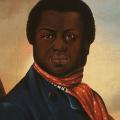42. James Sidbury on African Identity
An interview with James Sidbury about the emergence of a self-conscious African identity in the diaspora.
Themes:
• J. Sidbury, “Early Slave Narratives and the Culture of the Atlantic Market,” in E.H. Gould and P.S. Onuf, Empire and Nation (Baltimore: 2005), 260-74.
• J. Sidbury, Ploughshares into Swords: Race, Rebellion, and Identity in Gabriel’s Virginia, 1730–1810 (Cambridge: 1997).
• J. Sidbury, “Thomas Jefferson in Gabriel’s Virginia,” in J.E. Lewis et al. (eds), The Revolution of 1800: Democracy, Race, and the New Republic (Charlottesville: 2002), 199-219.
• J. Sidbury, Becoming African in America: Race and Nation in the Early Black Atlantic (Oxford: 2007).
• J. Sidbury, "From Igbo Israeli to African Christian: The Emergence of Racial Identity in Olaudah Equiano's Interesting Narrative," in S. Palmié (ed), Africas of the Americas: Beyond the Search for Origins in the Study of Afro-Atlantic Religions (Leiden: 2008), 79-106.
• J. Sidbury (with J. Cañizares-Esguerra), "Mapping Ethnogenesis in the Atlantic World," William and Mary Quarterly 68 (2011): 181-208.
• J. Sidbury, "'African' Settlers in the Founding of Freetown," in P. Lovejoy and S. Schwarz (eds), Slavery, Abolition and the Transition to Colonialism in Sierra Leone (Trenton: 2015), 127-42.







Comments
L'identité est un concept ds plus ambigus, de la "vérité" ultime de Platon à l'omniscience du dieu suprême, en passant par LA communauté imposé à l'individu, ou pire, à la personne, LA langue (le grec en philosophie? Mais que parlent alors les "penseurs", du charabia?), LA morale (exclusive de toutes les éthiques) ou LA réalité (que tout scientifique honnête ignore, tout comme le bon vieux Socrate).
P.S. Je n'ai pas vu la vidéo, je la verrai.
Pragmatism
While listening to this episode, during the part where the guest spoke about the decision to (strategically) not part with the monarchical system in Haiti and then Sierra Leone, i couldn't stop thinking about the (in my opinion) naive criticism, from mostly western liberal "leftists", that i constantly see towards socialist project that ensued after the October Revolution in the former Soviet Union. It is pretty obvious, if we disregard the idealist approach of judging a political system based on an ideal, abstract notion of how a certain political system "ought" to look like without taking into account the material necessities that arise in the moment after a revolution takes place, namely to ensure that it does not get undermined from antagonist internal and external forces and can, first of all, survive (which is literally the point right?), that those types of critical analysis are deficient from the start and do not contribute to an accurate understanding of the political system being analysed. Analysing the political setbacks and detours from what it ideally wanted to achieve needs to be done in a way that takes into account the social necessities that forced them in the first place, rather then measuring it with an abstract stick, something that plagues western societies as a whole in my opinion, and that 100% of the times results in condescending and a-historical criticism. This episode was really insightful in this regard, thank you very much.
In reply to Pragmatism by Edgar
Pragmatism
Glad you enjoyed this episode! I have actually been listening to the excellent Revolutions podcast which has been covering the Russian Revolution in great depth, and what you say resonates with that presentation pretty well. I get the sense that the Bolsheviks won out over the many other candidates to succeed the Czarist system because they were the most "pragmatic" though this is a polite word - basically, they were completely cutthroat and very flexible about which of their promises they'd keep. Obviously this observation doesn't exactly sound like praise for the Bolsheviks but I do think it is why they succeeded, and it very much set the tone for subsequent Soviet history. (Another way to put it is that survival of the Bolshevik state was indeed their goal, as you say; and not establishing a socialist utopia which seems to have been relegated to "we'll get to that eventually" from day 1, pretty much.)
In reply to Pragmatism by Edgar
Protecting Identity
I think this is a great point and I one which we will eventually see more of, I suspect, as the European podcast drags its way into the 18th and 19th centuries. The Holy Roman Empire was by that time essentially a system of special privileges that protected many different kinds of 'corporate identities' against any other of those identities subsuming it. (This is the interpretation of Peter Wilson and I'm inclined to follow any expert called Peter.) The case illustrates a running battle at that time between older, more parochial identities and the homogenising forces of the state and nation. For a long time historians have seen that kind of homogenisation as a good thing, but these days we're more inclined to be sympathetic to a system that could uphold liberties and diversities. Many people wanted a system that could guarantee their separate characteristics and ways of living over the Enlightenment's tendency to conflate humanity, including, it seems, in Sierra Leone.
Add new comment